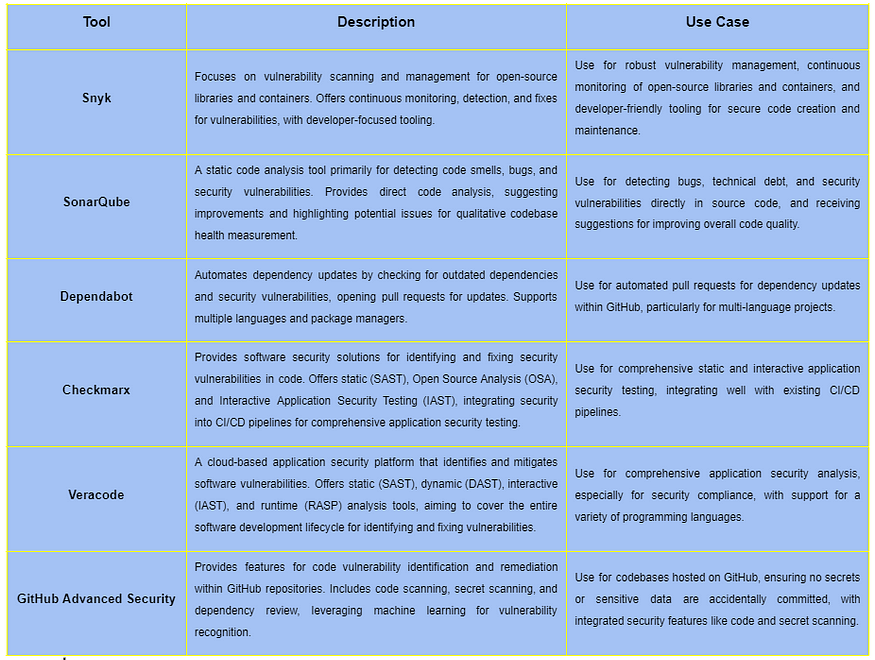Dependabot vs. the Competition: Redefining Automated Dependency Management
 Sugam Arora
Sugam Arora

Introduction
In the ever-evolving landscape of software development, staying ahead often means keeping your dependencies up to date. Enter Dependabot, a stalwart in the realm of automated dependency management. While the concept of automated dependency updates isn’t new, Dependabot distinguishes itself with a blend of sophistication, adaptability, and seamless integration that sets it apart from its peers.
Dependabot isn’t just a tool; it’s a reliable ally, tirelessly scanning your projects for outdated dependencies and opening pull requests to update them. What sets it apart, however, is its intelligence. Dependabot understands the nuances of different ecosystems, ensuring that updates are not just automated but also safe and reliable. Its ability to navigate complex dependency graphs with precision and its knack for discerning between critical and non-critical updates make it a standout choice for developers seeking a balance between automation and control.
But Dependabot’s prowess doesn’t stop there. Its flexibility is another key differentiator. Unlike some tools that impose rigid workflows, Dependabot seamlessly integrates into your existing development process. Whether you use GitHub, GitLab, or Bitbucket, Dependabot effortlessly integrates with your preferred platform, adapting to your workflow rather than dictating it.
Moreover, Dependabot’s proactive approach to security sets it apart. While some tools focus solely on version updates, Dependabot goes further by actively monitoring for security vulnerabilities. By alerting you to potential security risks and suggesting fixes, Dependabot helps you fortify your software against potential threats, all while keeping your dependencies up to date.
In a world where software development is increasingly complex and fast-paced, Dependabot stands out as a beacon of reliability, intelligence, and security. As we delve deeper into the intricacies of this remarkable tool, we’ll explore its inner workings, its unique features, and how it stacks up against other automation tools in the market. Join us on a journey through the world of Dependabot, where automation meets intelligence, and reliability reigns supreme

Dependabot vs. Other Automation Tools: A Comparative Analysis
1. Snyk:
Focus: Primarily focuses on open-source security and dependency management.
Integration: Integrates well with various CI/CD pipelines and development environments.
Features: Provides vulnerability scanning, license compliance checks, and container security.
Scope: Covers a wide range of programming languages and package managers.
Differentiator: Strong focus on open-source vulnerabilities and remediation.
2. SonarQube:
Focus: Concentrates on code quality and security issues within the codebase.
Integration: Integrates into the development workflow to provide real-time feedback.
Features: Offers code analysis, technical debt management, and code smell detection.
Scope: Analyzes code written in various languages for bugs, vulnerabilities, and code smells.
Differentiator: Emphasizes continuous inspection of code quality and security as part of the development process.
3. Veracode:
Focus: Specializes in application security testing (AST) and secure development.
Integration: Integrates with various development and security tools for a comprehensive security workflow.
Features: Provides static analysis, dynamic analysis, software composition analysis, and manual penetration testing.
Scope: Covers a wide range of applications and programming languages.
Differentiator: Offers a broad set of security testing capabilities for applications, including SaaS, mobile, and third-party components.
4. Checkmarx:
Focus: Offers static application security testing (SAST) and software composition analysis (SCA) solutions.
Integration: Integrates with popular CI/CD tools and IDEs for seamless security testing.
Features: Provides static code analysis, software composition analysis, and developer-centric security testing.
Scope: Analyzes code for vulnerabilities, including SQL injection, cross-site scripting (XSS), and other security flaws.
Differentiator: Focuses on providing developers with tools to identify and fix security vulnerabilities early in the development process.
5. GitHub Advanced Security:
Focus: Provides security features integrated into the GitHub platform.
Integration: Seamlessly integrates with GitHub repositories and workflows.
Features: Offers dependency scanning, code scanning, secret scanning, and security advisories.
Scope: Focuses on enhancing the security of code hosted on GitHub.
Differentiator: Provides security features directly within the GitHub ecosystem, making it convenient for developers to manage security alongside their code.

Conclusion
In the realm of automated software development tools, each solution brings a unique set of capabilities to the table, catering to different aspects of the development lifecycle. Dependabot shines as a specialist in automated dependency management, with a keen focus on keeping dependencies up to date and secure. Its seamless integration with version control platforms, particularly GitHub, makes it a convenient and efficient choice for teams looking to streamline their dependency management workflows.
Snyk, on the other hand, specializes in open-source security and dependency management, offering comprehensive vulnerability scanning and license compliance checks. SonarQube focuses on code quality and security within the codebase, providing detailed analysis and feedback to improve code maintainability and security. Veracode offers a comprehensive suite of security testing capabilities for applications, including static analysis, dynamic analysis, software composition analysis, and manual penetration testing. Checkmarx provides SAST and SCA solutions, emphasizing early identification and mitigation of security vulnerabilities in code. GitHub Advanced Security integrates security features directly into the GitHub platform, offering dependency scanning, code scanning, secret scanning, and security advisories.
The choice of automation tool ultimately depends on the specific needs and priorities of the development team. For teams seeking a specialized and effective solution for dependency management, Dependabot stands out as a reliable and intelligent choice.
Thank you for taking the time to read my blog. Your feedback is immensely valuable to me. Please feel free to share your thoughts and suggestions.
Subscribe to my newsletter
Read articles from Sugam Arora directly inside your inbox. Subscribe to the newsletter, and don't miss out.
Written by
